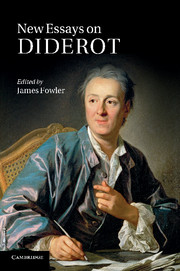Book contents
- Frontmatter
- Contents
- Notes on contributors
- Acknowledgements
- List of abbreviations
- Introduction
- PART I DIDEROT THE PHILOSOPHE
- PART II NOVELS
- PART III DIALOGUES
- PART IV PLAYS AND DRAMATIC THEORY
- 12 Diderot and Olympe de Gouges convert the tyrant and transform the family
- 13 Diderot and Destouches: Le Philosophe marié in Est-il bon? Est-il méchant?
- PART V MUSIC, PERFORMANCE, AESTHETICS
- Select bibliography
- Index
- References
13 - Diderot and Destouches: Le Philosophe marié in Est-il bon? Est-il méchant?
Published online by Cambridge University Press: 11 April 2011
- Frontmatter
- Contents
- Notes on contributors
- Acknowledgements
- List of abbreviations
- Introduction
- PART I DIDEROT THE PHILOSOPHE
- PART II NOVELS
- PART III DIALOGUES
- PART IV PLAYS AND DRAMATIC THEORY
- 12 Diderot and Olympe de Gouges convert the tyrant and transform the family
- 13 Diderot and Destouches: Le Philosophe marié in Est-il bon? Est-il méchant?
- PART V MUSIC, PERFORMANCE, AESTHETICS
- Select bibliography
- Index
- References
Summary
To say that Diderot's most famous contribution to the theatre is his invention of the drame, which combines sentimentalism and didacticism, is simply to repeat a commonplace. Yet one can argue that the sentimental strain was already well established in French theatre when he began his dramatic experiments in the 1750s, and that the recognition of the didactic possibilities of theatre went back much further. Nevertheless, it remains Diderot who gets the credit or, perhaps more often in the eyes of posterity, the blame for the combination of the two which would be such a dominant force in French theatre for the rest of the century. There was bound to be a reaction, and it came from within as well as from without: that staunch disciple of Diderot's dramatic theory Beaumarchais sought to reintroduce ‘l'ancienne et franche gaîté’ (‘the uninhibited gaiety of the old days’) into comedy in Le Barbier de Séville (The Barber of Seville) in 1773, even if he did revert to his earlier ways in La Mère coupable (The Guilty Mother); and Sedaine followed his creation of one of the finest of the drames, Le Philosophe sans le savoir (The Philosopher Who Doesn't Know It) (1765), with the much more conventional comedy La Gageure imprévue (The Unexpected Wager) (1768).
A striking aspect of the burst of activity in which Diderot inaugurated the drame is its brevity: Le Fils naturel (The Natural Son), including the satellite texts that give it its fictional context and set out the dramatic theory behind it, dates from 1757, and Le Père de famille (The Father), together with De la poésie dramatique (On Dramatic Poetry), from 1758.
- Type
- Chapter
- Information
- New Essays on Diderot , pp. 187 - 200Publisher: Cambridge University PressPrint publication year: 2011

